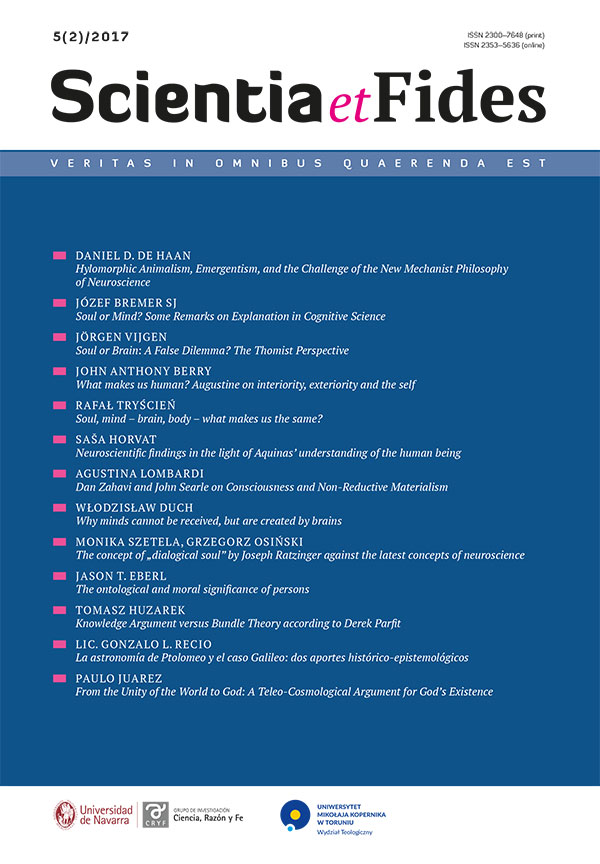Soul or Brain: A False Dilemma? The Thomist Perspective
Słowa kluczowe
Thomas Aquinas, anthropology, soul, bodyAbstrakt
In this article I will claim that from a Thomist perspective the question “Soul or Brain: What makes us human?” presents us with a false dilemma and hence must as such remain an unanswerable question. In order to corroborate this claim I will do two things. First, I present the framework of a Thomistic anthropology in so far as it relates to the unity of soul and body in the human person. Next, I deal with the question that immediately results from this unity, i.e. the subsistence of the soul. From a Thomist perspective this question can be answered apart from any findings from neuroscience.
Bibliografia
Albertus Magnus. 1895. Summa theologiae, edited by Augustus Borgnet, t. 33. Paris: Vivès.
Anzulewicz, Henryk. 2013. “Anthropology: The Concept of Man in Albert the Great.” In A Companion to Albert the Great, edited by Irvin M. Resnick, 325–346. Leiden / Boston: Brill.
Aquinas, Thomas. 2001. S. Thomae de Aquino Opera omnia, edited by Enrique Alarcón, Pampilonae: Ad Universitatis Studiorum Navarrensis. http://www.corpusthomisticum.org
Augustine, Aurelius. 1986. De quantitate animae, edited by Wolfgang Hörmann. Vindobonae : Hoelder-Pichler-Tempsky (Corpus Scriptorum Ecclesiasticorum Latinorum 89).
Augustine, Aurelius. 1955. De Civitate Dei, edited by Bernhard Dombart. Turnhout: Brepols (Corpus Christianorum Series Latina 48).
Augros, Robert. 2004. “Reconciling Science with Natural Philosophy.” The Thomist 68:105–141.
Balthasar, Hans Urs Von. 1951. Karl Barth. Darstellung und Deutung seiner Theologie, Köln: Hegner.
Barth, Karl. 1948. Kirchliche Dogmatik, Bd I/2, Zürich, EVZ.
Bazan, Bernardo C. 1997. “The Human Soul: Form and Substance? Thomas Aquinas' Critique of Eclectic Aristotelianism.” AHDLMA 64:95–126
Bieniak, Magdalena. 2010. The Soul-Body Problem at Paris ca 1200–1250: Hugh of St-Cher and His Contemporaries. Leuven University Press: Leuven.
Blankenhorn, Bernard. 2015. The Mystery of Union with God. Dionysian Mysticism in Albert the Great and Thomas Aquinas. CUA Press: Washington D.C.
Bochet, Isabelle. 2016. “Le corps: un poids pour l’âme. L’exégèse augustinienne de Sagesse 9, 15.” Revue des sciences philosophiques et théologiques 100:27–43.
Brock, Stephen L. 2005. “The Physical Status of the Spiritual Soul in Thomas Aquinas.” Nova et Vetera. (English Edition) 2:231–258.
De Boer, Sander. 2013. The Science of the Soul: The Commentary Tradition on Aristotle's De Anima, c. 1260 – c. 1360. Leuven University Press: Leuven.
Echavarría, Martín F. 2009. La praxis de la psicología y sus niveles epistemológicos según santo Tomás de Aquino. Editorial de la Universidad Católica de La Plata: La Plata.
Elders, Leo. 1997. The philosophy of nature of St. Thomas Aquinas. Peter Lang: Frankfurt am Main.
Emery, Gilles. 2000. L’unité de l’homme, âme et corps, chez S. Thomas d’Aquin. Nova et Vetera 75:53–76.
Emery, Gilles. 2007. Trinity, Church, and the Human Person. Thomistic Essays. Naples (FL): Sapientia Press.
Gondreau, Paul. 2008. “The inseparable connection between procreation and unitive love and Thomistic hylomorphic anthropology.” Nova & Vetera. (English Edition) 4:731–764.
Hasse, Dag N. 2000. Avicenna's De Anima in the Latin West. Warburg Institute: London.
Jonas, Hans. 1981. Macht oder Ohnmacht der Subjektivität? Das Leib-Seele-Problem im Vorfeld des Prinzips Verantwortung. Frankfurt am Main: Insel. (Das Prinzip Verantwortung. Erster Teilband: Grundlegung, edited by Dietrich Böhler and Bernadette Herrmann, 421–510. Freiburg im Breisgau: Rombach (Kritische Gesamtausgabe der Werke von Hans Jonas I,2a).
Kläden, Tobias. 2005. Mit Leib und Seele… Die mind-brain-Debatte in der Philosophie des Geistes und die anima-forma-corporis-Lehre des Thomas von Aquin. Regensburg: Friedrich Pustet Verlag.
Luyten, Norbert. 1963. “The significance of the body in a Thomistic anthropology.” Philosophy Today 7:175–193.
Marcel, Gabriel. 2001. The Mystery of Being. Translated by G. S. Fraser. South Bend IN: St. Augustine’s Press. (Original French: Le Mystère de l'être. Paris: Aubier, 1951).
Merleau-Ponty, Maurice. 2002. The Phenomenology of Perception. Translated by C. Smith. Routledge: London and New York. (Original French : Phénoménologie de la Perception. Gallimart: Paris, 1945).
Nicolas, Marie-Joseph. 1979. “Le corps humain,” Revue Thomiste 79:357–387.
Oguejiofor, Josephat O. 2001. The Philosophical Significance of Immortality in Thomas Aquinas. The University Press of America: New York.
Royal, Robert. A Deeper Vision: The Catholic Intellectual Tradition in the Twentieth Century. San Francisco: Ignatius Press.
Scarpelly Cory, Therese. 2016. “The Reflexivity of Incorporeal Acts as Source of Freedom and Subjectivity in Aquinas.” In Subjectivity and Selfhood in Medieval and Early Modern Philosophy, edited by Jari Kaukua and Tomas Ekenberg, 125–141. Dordrecht: Springer.
Scheffczyk, Leo. 2008. Katholische Glaubenswelt. Wahrheit und Gestalt. Paderborn: Schoeningh, 3. durchgesehene Auflage, Original edition 1977.
Wéber, Edouard H. 1991. La personne humaine au XIIIe siècle. Vrin :Paris.
Weisheipl, James A. 1980. Thomas d’Aquino and Albert, his Teacher. PIMS: Toronto.
Pobrania
Opublikowane
Jak cytować
Numer
Dział
Licencja
CC BY ND 4.0. Posiadaczem prawa autorskiego (Licencjodawcą) jest Autor, który na mocy umowy licencyjnej udziela nieodpłatnie prawa do eksploatacji dzieła na polach wskazanych w umowie.
- Licencjodawca udziela Licencjobiorcy licencji niewyłącznej na korzystanie z Utworu/przedmiotu prawa pokrewnego w następujących polach eksploatacji: a) utrwalanie Utworu/przedmiotu prawa pokrewnego; b) reprodukowanie (zwielokrotnienie) Utworu/przedmiotu prawa pokrewnego drukiem i techniką cyfrową (e-book, audiobook); c) wprowadzania do obrotu egzemplarzy zwielokrotnionego Utworu/przedmiotu prawa pokrewnego; d) wprowadzenie Utworu/przedmiotu prawa pokrewnego do pamięci komputera; e) rozpowszechnianie utworu w wersji elektronicznej w formule open access na licencji Creative Commons (CC BY-ND 3.0) poprzez platformę cyfrową Wydawnictwa Naukowego UMK oraz repozytorium UMK.
- Korzystanie przez Licencjobiorcę z utrwalonego Utworu ww. polach nie jest ograniczone czasowo ilościowo i terytorialnie.
- Licencjodawca udziela Licencjobiorcy licencji do Utworu/przedmiotu prawa pokrewnego nieodpłatnie na czas nieokreślony
PEŁEN TEKST UMOWY LICENCYJNEJ >>
Statystyki
Liczba wyświetleń i pobrań: 1881
Liczba cytowań: 1



